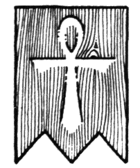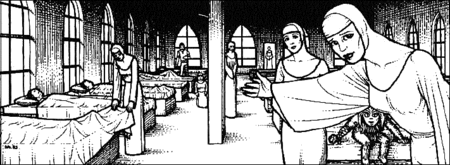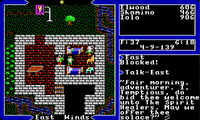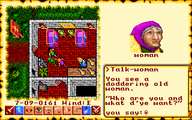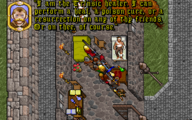Healer
This article is about the healing profession in general terms. For other uses, see Healer (disambiguation).
Healers have shops in many cities and villages, and in some castles and keeps. They do specialize in healing injuries and curing sicknesses.
Description[edit]
A healer is important for society. The vast wildernesses of Britannia, though rich in beauty, also hold hidden dangers capable of causing travellers injury or illness. Bold knights frequently incur serious wounds during battle and the healer can treat these. Poison and plague also take their toll, fortunately, medicine is advanced in the treatment of just these problems by the healer, ridding the body of what makes it sick. In both cases, the quality of the healer decides on life or death. The greatest achievement of healers is the ability to return recently deceased people from death without any further problem – although only the most experienced healers are capable of such a feat and the prices for such a miracle are quite high.
While it is hard to say any price is unfair for saving a life, some healers are known for their reasonable prices and others are not. Skara Brae's healer has been known to heal even those who cannot pay at all. Few health problems are beyond the ken of the healers, whether disease, wounds, or poison.
History[edit]
Age of Darkness[edit]
The Age of Darkness was indeed a dark age for the art of healing, as during the times of Ultima I and Ultima II, the privilege of healing was limited to monarchs, who demanded a steep tribute in form of gold, before they would magically heal injuries.
Only starting with Ultima III did common healers appear, offering to treat wounds, cure poison or resurrect the dead. However, due to the inexperience of this craft at the time, there always was a chance of accidentally burning a body to ashes instead of resurrecting it. The healers also could use Anju Sermani to recall from the ashes – a tactic later outlawed due to the steep price of this magic.
Age of Enlightenment[edit]
The art of healing stayed the same during the Age of Enlightenment, except that resurrections were guaranteed, thus the standard three services were offered. While all healers normally required payment for all services in Ultima III, curing poison would be free if the party was unable to afford it. Some healers would perform healings and curings for free in Ultima V, especially one in Minoc. In Ultima VI, most healers, but not all, would cure and heal even if the party was penniless. Resurrection, however, always carried a hefty price.
Gargoyle healers at that time had no concept of resurrection whatsoever and were confused when it was mentioned.
Age of Armageddon[edit]
In the Age of Armageddon, in Ultima VII, the Fellowship waged an ideological war onto the healers of Britannia, calling them charlatans and their ways ineffective, promoting their own alternatives in form of just strong faith, which was a sham. The disturbed ether at the time made resurrections a hazardous thing at best, with a high failure rate. Research during that time by the healer Csil indicated further medical progress.
This once abundant profession was almost entirely eradicated in the Great Cataclysm, thus only one healer was encountered during Ultima IX and her shop was closed because of a personal crisis.
Other Worlds[edit]
On the Serpent Isle, magical healing was not practiced in Moonshade – as even Erstam admitted that the mages did not understand the healing arts – and in the cities of Fawn and Monitor, magic was mistrusted. Thus in the latter two cities, herbalists specialized in healing with non-magical means – logically excluding resurrections. Harnna and Delphynia were the respective healers in Ultima VII Part Two.
On Pagan, the Theurgists had the exclusive ability to heal. However, should one be encountered, he would heal free of charge.
Lore[edit]
| “ | In remote areas may be found Healer Kiosks. Their restorative powers can be purchased, although the tariff is steep. – from The Book of Play (Ultima III)
|
|---|
| “ | Some towns contain these invaluable places of aid where one may go to be healed when suffering from grievous wounds. Remember to heal thy companions also, for a healthy party ensures survival in the wild regions. The Healers are the only ones who may cure victims of the noxious venom inflicted by the inhuman denizens of the land. – from The History of Britannia (Ultima IV)
|
|---|
| “ | Healers have shoppes in many cities and villages, and in some castles and keeps. Bold knights frequently incur serious wounds. Poison and plague also take their toll. Fortunately, medicine is advanced in the treatment of just these problems. While it is hard to say any price is unfair for saving a life, some healers are known for their reasonable prices and others are not. Skara Brae’s healer has been known to heal even those who cannot pay at all. Few health problems are beyond the ken of the healers, whether disease, wounds, or poison. Some healers are even experimenting with the concept of resurrection. There have rumbled persistent rumors of magical resurrection techniques being used by extremely adept mages within closeknit, secret groups. There is still some controversy over whether such techniques should be pursued, but Lord British is known to have supported the research at every turn. – from The Book of Lore (Ultima V)
|
|---|
| “ | The vast wildernesses of Britannia, though rich in beauty, also hold hidden dangers capable of causing travelers injury or illness. Luckily, many towns have professional people trained in the medicinal arts. Healers can turn back the ravages of swamp poison or heal wounds earned in battle. Some physicians claim that their healing arts have been enhanced and augmented by magic, to the point they can resurrect the dead! – from Compendium (Ultima VI)
|
|---|
| “ | Many who succumb to injury or illness have their conditions worsened and their purses lightened by a healer. The wise traveller knows that sickness and injury is rooted chiefly in the mind and that only through self-discipline can pain, illness and injury be overcome. – from The Book of Fellowship (Ultima VII)
|
|---|
| “ | Healers provide several valuable services. Not only are we able to enhance the body’s natural healing process, but we can also eliminate many toxins that plague the body. Though our techniques vary in many ways — for example, Elad of Moonglow prefers to emphasize the curative aspects of herbs, whilst I am more fond of proper cleaning and bandaging — all healers must have a good grasp of magic to perform perhaps our most important service: resurrection. However, to the patient, most of these issue are trivial, for few truly care how we perform our services, as long as we perform them well. Most who require our aid are concerned about quite another facet. Whilst we are all, I am sure, quite equally competent as healers, there is a noticeable difference in our prices. And this, coupled with our proximity in relation to the wounded, will be the greatest determinant of each healer’s usefulness. – from Key to the Black Gate (Ultima VII)
|
|---|
| “ | Perhaps the only forms of true magic not fully understood by mages are the healing arts. While any healer will tell thee that the body, assisted by herbs and proper treatment, is a powerful force in curing itself, it is evident that some wizardry must be involved. Many times have I seen a healer apply a concoction that instantly removed all traces of a wound. No doubt magic is afoot! |
|---|
Gallery[edit]
The Spirit Healers in Ultima V
Wounds of Honor in Ultima VI
Healer Chantu in Ultima VII
| Shops | |
|---|---|
| Shops | Apothecary ☥ Armoury ☥ Bakery ☥ Clothier ☥ Fletchers and bowyers ☥ Grocery Healer ☥ Inn ☥ Jeweler ☥ Provisioner ☥ Shipwright ☥ Stables ☥ Tavern ☥ Trainer |
| Shops of Old | Armour shop ☥ Magic shop ☥ Oracle ☥ Weapon shop |
